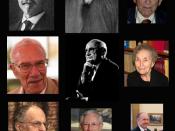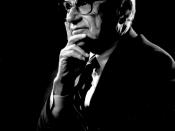Society is faced with the everyday problem of unlimited wants and limited resources; this is what economists call the "economic problem." Hence, the study of how to deal with the economic problem is called "economics". Economics mainly "associates with the production, distribution, and consumption of goods and services with the theory and management of the economy," (http://dictionary.reference.com/search?q=Economics). Economists study the patterns and trends in economic systems. With the gained information, economists are able to predict the future economy. A common factor in economics is money. "Monetarism" is the economic term that refers to the "influence of money in the economy and that the economy is able to adjust to shocks without government intervention," (Lovewell, p.350, 2005). The economist related to monetarism is Milton Friedman. At age 92, he is among the most popular living economists and is recognized globally of his doctrine of monetarism (Blaug, p.62, 1985).
Friedman was born on July 31, 1912, in Brooklyn, New York to two poor Jewish immigrants, Jeno and Sarah Friedman.
He graduated from Rahway High School in New Jersey before his sixteenth birthday and received a scholarship to Rutgers University. He graduated with a major in economics, but he decided to further enhance his studies. Along his way, he met Homer Jones, who introduced him to "rigorous economic theory, made economics exciting and relevant, and encouraged him to continue graduate work. On his recommendation, the Chicago Economics Department offered him a scholarship, where he earned his MA (Master of Arts)," (http://nobelprize.org/economics /laureates/1976/friedman-autobio.html). In Chicago, he met a shy, withdrawn, and lovely girl, Rose, whom he married six years later. After completing studies in Chicago, he attended Columbia and received his PhD. While studying, Friedman encountered the experience of working as research assistants and professors. Throughout his career, he wrote many books, including,



Friedman
i learned a lot about economics that i didn't know before.
1 out of 1 people found this comment useful.